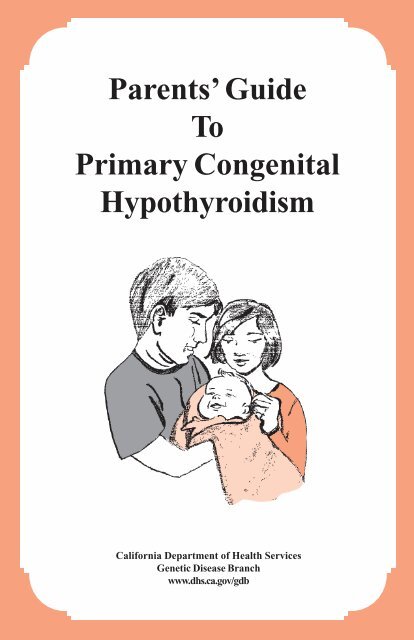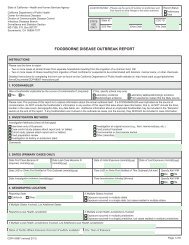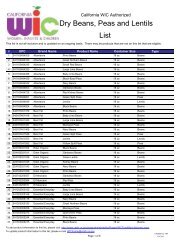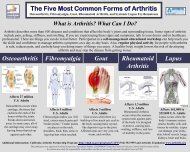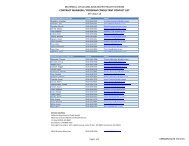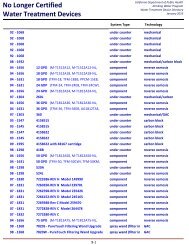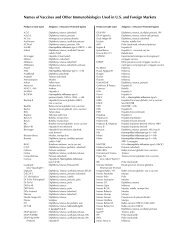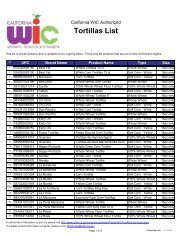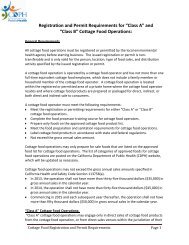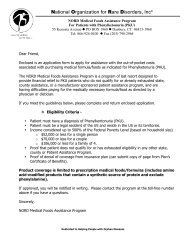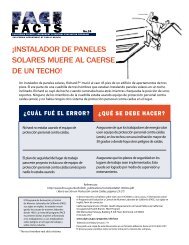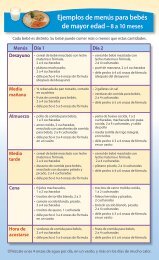Parents' Guide To Primary Congenital Hypothyroidism - California ...
Parents' Guide To Primary Congenital Hypothyroidism - California ...
Parents' Guide To Primary Congenital Hypothyroidism - California ...
You also want an ePaper? Increase the reach of your titles
YUMPU automatically turns print PDFs into web optimized ePapers that Google loves.
Parents’ <strong>Guide</strong><br />
<strong>To</strong><br />
<strong>Primary</strong> <strong>Congenital</strong><br />
<strong>Hypothyroidism</strong><br />
<strong>California</strong> Department of Health Services<br />
Genetic Disease Branch<br />
www.dhs.ca.gov/gdb
<strong>To</strong> Parents:<br />
<strong>California</strong> State Law requires that all babies have the newborn<br />
screening test before leaving their hospital of birth. A few drops of<br />
blood were taken from your baby’s heel. One of the tests was for<br />
primary congenital hypothyroidism.<br />
Your health care provider may have told you your baby has primary<br />
congenital hypothyroidism. Babies can look healthy at birth and still<br />
have this disorder, but babies, who are not treated, often have<br />
serious and permanent health problems. With early and ongoing<br />
care, your baby should develop normally both physically and<br />
mentally.<br />
This booklet was written to help parents learn more about this<br />
disorder. Use this booklet to learn more about how to care for your<br />
child.<br />
For more information about the Newborn Screening Program or<br />
primary congenital hypothyroidism visit our website at<br />
www.dhs.ca.gov/gdb then click on Newborn Screening.
What Is <strong>Primary</strong> <strong>Congenital</strong> <strong>Hypothyroidism</strong>?<br />
<strong>Primary</strong> congenital hypothyroidism occurs when there is a<br />
deficiency of the thyroid hormone caused by the failure of the thyroid<br />
gland to develop normally. As a result, the thyroid gland does not<br />
produce enough thyroid hormone to meet the body’s needs.<br />
“<strong>Congenital</strong>” means that it is present at birth.<br />
<strong>Primary</strong> congenital hypothyroidism is fairly common, occurring once<br />
in every 2,700 newborn babies within <strong>California</strong>. About 200 babies<br />
in <strong>California</strong> are born with this disorder each year. It may be found<br />
shortly after birth through routine screening and follow-up testing<br />
required by <strong>California</strong> law. Treatment must be started within the first<br />
weeks of life of infants to prevent development of mental retardation,<br />
learning disabilities, and/or growth delays. This condition is easily<br />
treated by daily thyroid hormone medicine taken by mouth.<br />
How Does Thyroid Hormone Work?<br />
The main thyroid hormones are<br />
made in the thyroid gland. The<br />
thyroid gland is normally located<br />
in the neck. Hormones are special<br />
chemicals that circulate throughout<br />
the body and affect the functioning<br />
of other organs. The thyroid<br />
thyroid gland<br />
hormones are extremely important<br />
in the development of the brain<br />
and central nervous system, for<br />
the growth of the bones and<br />
muscles as well as maintaining<br />
body temperature and metabolism. Without thyroid hormones,<br />
physical growth, mental development, and other bodily functions slow<br />
down or stop.<br />
1
Why Doesn’t The Thyroid Gland Work?<br />
A baby’s hypothyroidism is usually due to a problem with the thyroid<br />
gland. The gland may be too small, located in the wrong place, or<br />
absent altogether. The existing gland does not make enough thyroid<br />
hormone or may not make any at all. In some cases, the thyroid gland<br />
appears normal but is unable to produce hormones normally. In rare<br />
instances, congenital hypothyroidism may not be permanent. Instead, it<br />
may be transient (temporary) and last only a few weeks or months. This<br />
transient problem may be due to substances from the mother’s blood<br />
called antibodies, that block the baby’s thyroid gland from working.<br />
Occasionally, the problem is caused by medications given to the mother.<br />
How Is <strong>Primary</strong> <strong>Congenital</strong> <strong>Hypothyroidism</strong> Diagnosed?<br />
The screening test for primary congenital hypothyroidism measures a<br />
certain hormone Thyroid Stimulating Hormone (TSH). This hormone<br />
stimulates the thyroid gland to make more thyroid hormone. If this<br />
hormone is elevated on the newborn screening test, it means that further<br />
tests need to be done. In addition to repeating the TSH filter paper test,<br />
testing of the specific thyroid hormones and other indicators of thyroid<br />
function are done to confirm the diagnosis. Your baby’s doctor will take<br />
a very careful history, examine the baby, and may also order other tests,<br />
such as a thyroid scan and or bone age (X-ray). In infants with<br />
suspected transient disease, antibody tests in maternal/mother’s blood<br />
may be ordered.<br />
2
What Is The Treatment For <strong>Primary</strong> <strong>Congenital</strong><br />
<strong>Hypothyroidism</strong>?<br />
Once this disorder is diagnosed, the doctor will prescribe thyroid<br />
hormone for the baby. Thyroid hormone, also called thyroxine<br />
or T 4<br />
, comes in tablets. The baby’s doctor will tell you how much of<br />
the tablet or how many tablets to give your baby each day. It is very<br />
important that the baby receive enough thyroid hormone to grow<br />
and develop normally but not more than is needed. It is important to<br />
follow the doctor’s instruction carefully.<br />
With early and ongoing treatment, your baby should develop normally,<br />
both physically and mentally. In the majority of cases of primary<br />
congenital hypothyroidism, the treatment is lifelong. Blood tests will be<br />
done on a regular basis to determine if your child is getting the right<br />
amount of thyroid hormone. Remember that your baby is an individual<br />
and will develop his or her own growth pattern and intellectual ability.<br />
As he/she gets older her dose may change.<br />
How <strong>To</strong> Give Thyroid Hormone<br />
Be sure to give your baby thyroid hormone medicine every day.<br />
Only thyroxine tablets should be used. According to the America<br />
Academy of Pediatrics recommended guidelines, there are no Food<br />
and Drug Administration-approved liquid forms of thyroxine.<br />
Thyroxine suspensions prepared by individual pharmacists may lead<br />
to unreliable dosage.<br />
Give the tablets at the same time every day and make it a part<br />
of your routine so you do not forget.<br />
With newborn infants, the tablets need to be crushed and given very<br />
carefully. When your infant is older, it will be easier to give. There<br />
are several ways you can give the thyroid medicine.<br />
3
For the Infant:<br />
Crush tablet(s) between two spoons then mix with a small amount of<br />
water, breast milk or formula* that does not contain soy or iron.<br />
Give this mixture through a dropper on the side of the<br />
mouth between the cheek and gum. <strong>To</strong> be sure that<br />
all of the medicine is taken, draw up some water into<br />
the dropper after you have given the crushed tablet(s)<br />
and give this water to your baby. Use room<br />
temperature water. DO NOT mix with hot water.<br />
Or<br />
Wash hands well. Finely crush the tablet(s) between<br />
two spoons. Moisten your fingertips with water and<br />
dip into crushed tablet(s). Let your baby suck the crushed tablet(s) off<br />
your finger and continue to dip your finger in the crushed tablet(s) until<br />
no powder is left. Offer the baby a small amount of water after giving<br />
the tablet(s).<br />
For the Older Infant and <strong>To</strong>ddler:<br />
When your baby is on solid foods, you may want to try one of these<br />
methods.:<br />
Place tablet(s) on a spoon and add a few drops of water<br />
to soften them. After a few minutes, add a few drops<br />
of water on the spoon then feed this mixture to your baby.<br />
Mix the crushed tablet(s) in a small amount of<br />
baby cereal, applesauce, breast milk or formula*<br />
that does not contain soy or iron. Always keep this<br />
separate from the rest of your baby’s food. For example,<br />
if your baby is taking two tablespoons of cereal in the<br />
morning, mix the crushed thyroid tablet(s) with a ½ teaspoon<br />
of cereal in a separate dish. Give this portion to your baby.<br />
Some doctors recommend waiting at least one half hour after<br />
giving the tablet(s) before feeding your baby the rest<br />
of the meal. That way, you will know that your baby<br />
has received all the hormone.<br />
*Talk with your doctor before mixing with soy-based formula or formula that contains iron.<br />
4
DO NOT put the tablet(s) into a whole<br />
serving of the baby’s food. DO NOT<br />
put the tablet(s) in the baby’s bottle. The<br />
baby may not eat or drink the whole amount.<br />
When your child is older, he or she may take the whole<br />
tablet(s) by mouth. Since they are so small, they will either melt or<br />
be swallowed whole. The tablet(s) do not taste bad; they<br />
have very little taste. It is perfectly all right for the child to<br />
chew the tablet(s). Many children take thyroid tablet(s) in the<br />
morning just after they wake up and before breakfast.<br />
Other Recommendations<br />
1. Some doctors recommend waiting at least one half hour after giving<br />
the tablet before feeding your baby solid foods. Wait an hour if<br />
your baby has a tendency to spit up the feedings.<br />
2. If your baby spits up just after giving the medicine, then<br />
give another dose.<br />
3. Some foods and supplements may interfere with the absorption of<br />
thyroid hormone medications* when taken together. Talk with your<br />
baby’s doctor about any foods to avoid.<br />
4. Keep a record of when you give the medicine. You can mark a<br />
calendar when the tablets have been given. If you forget to give<br />
a dose on one day you can give<br />
twice the dose the next day. But<br />
never give more than twice the dose.<br />
<strong>To</strong>o much medicine can be just as<br />
dangerous as too little.<br />
*See References on page 9 for actual articles<br />
5
5. Call your doctor or nurse if your baby has any of the<br />
following symptoms for more than 24 hours:<br />
♦ diarrhea<br />
♦ shorter sleeping periods<br />
♦ irritability or nervousness, or<br />
♦ if there is anything else that worries you.<br />
6. Always keep an extra supply of the tablets for emergencies.<br />
Keep extra medicine in your diaper bag and with your<br />
emergency/earthquake supplies. Do not forget to check the<br />
expiration date.<br />
7. Always examine the tablets when the prescription is filled.<br />
Note the color and the number on the tablet to be sure it is<br />
the right dose.<br />
8. Be sure to bring the bottle of thyroid tablets with you to each<br />
doctor’s appointment.<br />
Follow-Up<br />
Your doctor will check the blood thyroid hormone levels on a<br />
regular basis. These blood tests help the doctor to adjust the<br />
medicine so your baby will get the correct amount. The dose may<br />
be adjusted as your baby grows.<br />
Although it is not always possible to determine the cause of<br />
congenital hypothyroidism at the time of diagnosis, your doctor will<br />
not want to delay treatment. Further studies may be done after the<br />
child is a year of age. These studies may include blood hormone<br />
tests, bone age test, thyroid scans, and biochemical or genetic tests.<br />
If you have any questions in the meantime, please call the person<br />
listed below.<br />
6
Glossary<br />
Bone age - An X-ray of the hand or knee bone to measure growth.<br />
Hormone - A chemical with a specific effect on other organs. A<br />
hormone is produced by a gland in the body.<br />
Thyroid gland - An internal organ in the body in the front part of the<br />
lower neck. It makes thyroid hormones that control many of the body’s<br />
functions.<br />
Thyroid scan - A test that is used to find the presence and location of<br />
the thyroid gland.<br />
T 4<br />
- Another name for thyroxine.<br />
Thyroxine - The main hormone produced by the thyroid gland (also<br />
called T 4<br />
).<br />
Thyroid Stimulating Hormone (TSH) or thyrotropin - A hormone<br />
produced by the pituitary gland that stimulates the thyroid gland to<br />
produce T 4<br />
.<br />
7
Notes<br />
8
Parent Resource<br />
The Magic Foundation, www.magicfoundation.org, or parent help<br />
line at 800-3 MAGIC 3 (800-362-4423).<br />
References for Physicians<br />
1. American Academy of Pediatrics Section on Endocrinology and<br />
Committee on Genetics, and American Thyroid Association<br />
Committee on Public Health Newborn Screening for <strong>Congenital</strong><br />
<strong>Hypothyroidism</strong>: Recommended <strong>Guide</strong>lines Pediatrics 91 (6):<br />
1203-1209. Http://aappolicy.aappublications.org/cgi/reprint/<br />
pediatrics; 91/6/1203.<br />
2. Jabbar MA, Larrea J, Shaw RA. Abnormal Thyroid<br />
Function Tests in Infants with <strong>Congenital</strong> <strong>Hypothyroidism</strong>:<br />
The Influence of Soy-based Formulas. J. Am Coll Nutr<br />
1997; 16:280-2.<br />
3. Cambell NR, Hasinoff BB, Stalts H, et al. Ferrous Sulfate<br />
Reduces Thyroxine Efficacy in Patients with <strong>Hypothyroidism</strong>.<br />
Ann Intern Med 1992; 117: 1010-3.<br />
Other Resources for Physicians<br />
1. Singh N, Singh PN, Hershman JM. Effect of Calcium<br />
Carbonate on the Absorption of Levothyroxine. JAMA<br />
2000 Jun 7; 283 (21): 2822-5.<br />
2. Liel Y, Harman-Boehm I, Shany S. Evidence for Clinically<br />
Important Adverse Effect of Fiber-enriched Diet on the<br />
Bioavailability of Levothyroxine in Adult Hypothyroid<br />
Patients. J Clin Endocrinolo Metab 1996; 81: 857-9.<br />
3. Http://www.medscape.com/druginfo/<br />
Type in Levothyroxine for search then click go. Click on<br />
patient handout on the left side.<br />
9
Acknowledgements<br />
We would like to thank the following people for their help in providing<br />
input into this revised booklet:<br />
* <strong>California</strong> Newborn Screening Area Service Centers medical<br />
directors, project directors, follow-up coordinators and other<br />
staff<br />
* Parents of children with primary congenital hypothyroidism<br />
* <strong>California</strong> Children’s Services Metabolic Centers medical<br />
directors and other endocrine specialists<br />
<strong>California</strong> Department of Health Services<br />
Genetic Disease Branch<br />
©Genetic Disease Branch, Newborn Screening Program, revised October, 2004


